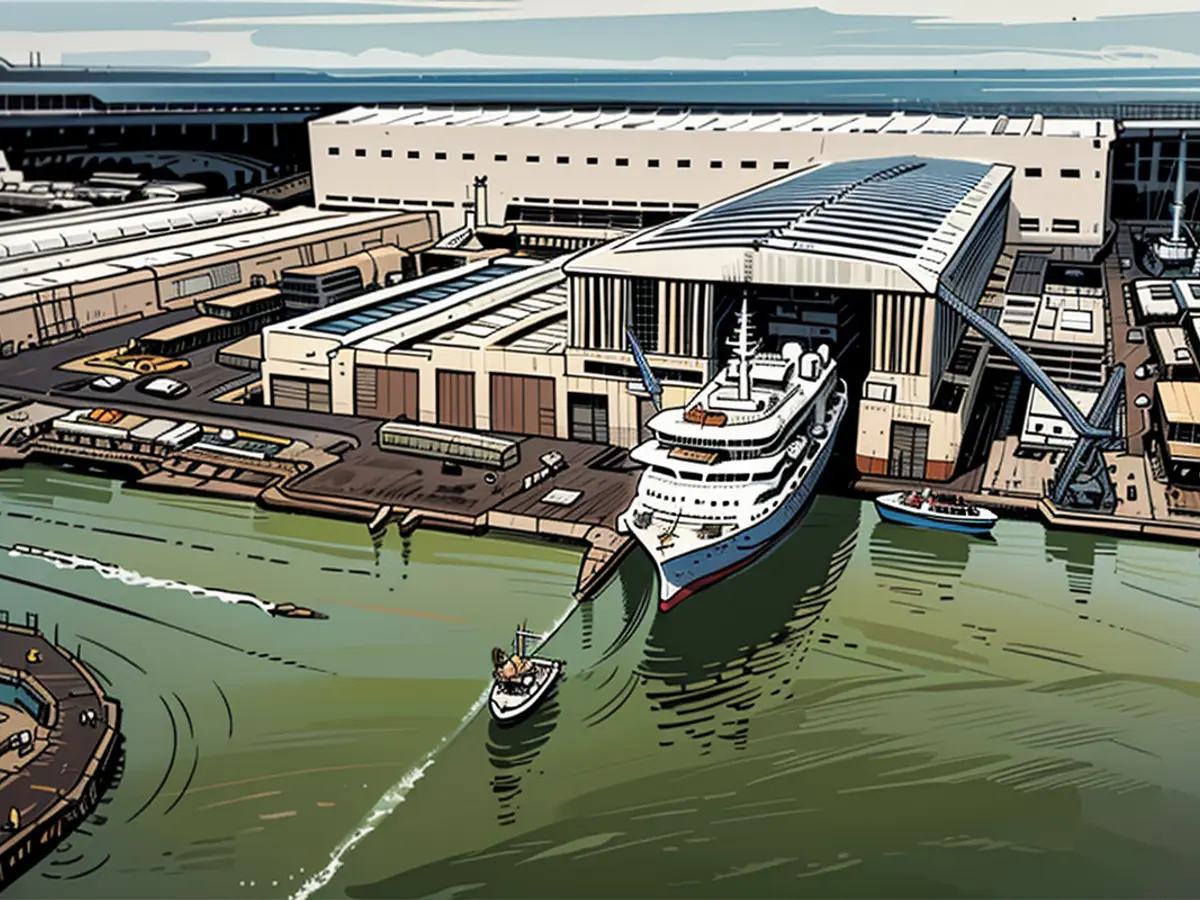- Northern German shipbuilders experiencing simultaneous boom and hardship
The scenario at prominent northern German shipbuilding facilities is painted as fluctuating between dire and mildly positive by labor committees. As per Stefan Timm from the Agency for Structural and Personnel Development, which conducted the 34th shipbuilding survey on behalf of IG Metall Coast, "We're in a delicate balance between full capacity utilization stretching up to 2032/2035, while other shipyards have finished their last assignments and face barren order lists." This dichotomy led to optimism among some, such as in the maritime sector, while others fretted over their employment.
Number of permanent workers on shipyards elevates
Timm commended, "Things look encouraging initially as we've recorded growth for the second consecutive year in terms of permanent workforce on shipyards." The drop-offs during the corona pandemic have been mitigated, resulting in a 5.3% increase in permanent workforce to 15,824 employees this year, compared to 2023. The regions of Bremen, Mecklenburg-Vorpommern, and Lower Saxony experienced notable growth, with increments between 7.2% and 7.5%. Hamburg saw an increase of 5.9%, and Schleswig-Holstein registered a modest rise of 1.1%.
Three influential German shipyard groups, ThyssenKrupp Marine Systems, Meyer, and Lürssen, which specialize in naval ships, cruise ships, and yachts, respectively, have added new hires. Over 70% of the 91,000 shipyard workforce and their affiliates operate here. However, the FSG-Nobiskrug Holding, majority-owned by investor Lars Windhorst, has shed over 100 jobs due to a lack of orders, according to IG Metall's representative for shipbuilding, Heiko Messerschmidt. "The workers are mowing lawns - and that isn't the role they envisioned for a shipbuilder."
The utilization of shipyards ranges from none to 100%
Timm revealed that the sector-wide utilization rate of shipyards is at 85.9%. Half of the shipyards reported full capacity, while the Windhorst shipyards reported utilization rates of 10% or less. Additionally, around 33% of shipyards anticipate an employment boost within the next 12 months, while 22% expect job cuts.
IG Metall demonstrated concern over the rise in temporary workers and contract labor, representing 13% of the total workforce. Timm characterized these employment relationships as "precarious and not extensively regulated by labor committees."
Skills gap and historically low training ratio prompt worry
IG Metall is particularly concerned about the skills deficit, which currently impedes production, and the historically low training quota of only 5.2%. Although the number of training slots has increased following the corona crisis for the first time, many businesses find it challenging to fill the vacancies, as reported in the survey.
"The shipbuilding industry is crucial for energy supply, commerce, and security in Germany," underlined Daniel Friedrich, district leader of IG Metall Coast. The announcement of an 80% stake purchase in troubled Meyer Werft by the federal government and the state of Lower Saxony is justified, according to Friedrich. "Of course, we need a policy that ensures the production remains within Germany and Europe to avoid further reliance on China."
Friedrich acknowledged, "There are numerous viewpoints" regarding the shipyard's future. He mentioned potential projects such as constructing converter platforms for offshore wind farms, installation ships, or the marine sector. "If we get it right, shipbuilding can once again evolve into a strong industrial sector with numerous high-paying jobs, collective bargaining agreements, and participation."
According to their statements, IG Metall has been surveying labor committees of shipyards and the maritime supply industry in the five northern German states of Bremen, Hamburg, Lower Saxony, Mecklenburg-Western Pomerania, and Schleswig-Holstein since 1991. This time, representatives from 46 shipyard operations and sites catering to both military and civilian shipbuilding were surveyed on working conditions, order situations, and prospective developments within their companies.
The optimism among some in the maritime sector is partly due to the belief that shipbuilding facilities could operate at full capacity until 2032/2035. Despite this, some shipyards are grappling with empty order lists and potential job losses.
Looking towards the future, IG Metall is concerned about the rising prevalence of temporary workers and contract labor in the shipbuilding industry, which they deem as precarious and under-regulated.








